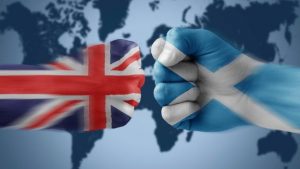Why the rest of Britain might want to leave Scotland
I was at dinner recently with a distinguished Fellow of All Souls who had served as a politician and is known for his incisive analysis. The conversation turned to Scotland and their forthcoming elections.
With some relish, my companion, English like me, listed the multiple reasons why the Scots should not want to leave the Union.
They would have problems with their currency. The Europeans would not want them back. Under current arrangements, they were considerable nett gainers from Westminster; independence would see their trade and incomes diminish. And would Shetland or Orkney then want to secede from Scotland? Or for that matter would some of the border constituencies reconstitute themselves, like the six counties of Northern Ireland, and want to reattach to the United Kingdom, with all the attendant tensions that have occurred in Ulster?
As much to stop him in his tracks as anything else, I asked him if he had ever turned the issue on its head. If the Scots enjoyed so many advantages by being part of the Union, what exactly did the rest of Britain gain by keeping them? If they wanted to go, and certainly if they voted to go, wouldn’t we be better off by just cutting them loose? Surely there was no logical or rational reason for wanting to keep Scotland in the Union, other than the very debatable merits of maintaining a nuclear base at Faslane?
He paused as if it was a question he had never considered. ‘Well, I suppose there is no logical or rational reason – but there is sentiment. We would feel diminished as a country. We would lose standing in the world. We would no longer be Great Britain.’
Really? And would that be such a bad thing? Given that a possible divorce is heading down the tracks at speed, perhaps it is worth examining this shibboleth in more detail.
Losing Scotland might be the best thing that’s ever happened to England (and perhaps Wales, although that’s a whole separate argument). As in any divorce, it might force us to re-evaluate and confront who we really are. That, let’s be honest, we no longer are Great Britain in anything but name. To stop pretending that we are an imperial power and one of the world’s policemen, who needs to launch aircraft cruisers when we don’t have enough planes to fill them, or patrol the Pacific as if we can possibly make any difference there whatsoever. To feel the need to be America’s bootboy in Afghanistan or Iraq.
And the rest of the world might respect us for having made that change. For looking forwards rather than constantly backwards to past glories. For being just ‘Britain’.
Instead we could concentrate on being a prosperous developed country that spends money on its healthcare and schools, like the Netherlands or Germany. A more modest country that lived within its means, but lives well, with less inequality. We still send far less of our GDP on such public spending than just about any of our neighbours. Germany had four times as many intensive care beds during the current covid crisis.
 We would still have considerable critical mass. The population of Scotland is only 5.5 million compared to an overall UK population of 67.5 million. So losing Scotland would take just a little fat off the bone. Some at Westminster might argue excess fat, given both how much they pay to keep them in the Union and how roundly they get abused for their pains.
We would still have considerable critical mass. The population of Scotland is only 5.5 million compared to an overall UK population of 67.5 million. So losing Scotland would take just a little fat off the bone. Some at Westminster might argue excess fat, given both how much they pay to keep them in the Union and how roundly they get abused for their pains.
.
The left and the right of first Brexit and then the Corona crisis have already forced us to start thinking about what we really, really want in life. Maybe a divorce from Scotland will wake us up to the fact that rather than the long lingering post-imperial fantasies of grandeur, we’re just another European country.
One thing is also for sure. Nothing is messier than a contested divorce. If the Scots want to go, the rest of Britain should let them, indeed help them.
I asked my companion at dinner what would happen if the Scots gave a majority to those various parties proposing a referendum, and that Westminster then refused to give it to them. And suggested that we could easily see violence erupting on the streets of Glasgow and other Scottish cities as a result, as happens when a political voice is suppressed in a way that is seen to be unjust.
‘Well the British government would be perfectly within their rights to send in the troops,’ he said.
‘You mean just like they did in Ulster at the end of the 1960s? Which ended so well.’
 ‘We would be within our rights.’ And he clenched his jaw. It was a look that signalled that there would be arguments about the curtains, the second car, who got which paintings and that the whole thing would inevitably end up in court. Messily.’
‘We would be within our rights.’ And he clenched his jaw. It was a look that signalled that there would be arguments about the curtains, the second car, who got which paintings and that the whole thing would inevitably end up in court. Messily.’
As a leading divorce lawyer once told me, whatever the rights and wrongs, there comes a time just to walk away.
.
And if it’s sentiment that’s leading us – a dangerous guide at the best of times – you could argue that we would just be returning to a more natural state of England. If it was good enough for Elizabeth I, isn’t it good enough for us? The union with Scotland, precipitated by dynastic concerns and the accidents of hereditary, may just have been a temporary aberration. Both parties might be far better off going alone again. After all, we already have our own football teams. Although perhaps, given their respective records, that isn’t such a hopeful analogy.
————————
Hugh Thomson’s books include The Green Road Into The Trees: An Exploration Of England (Random House) which won the Wainwright Prize.
